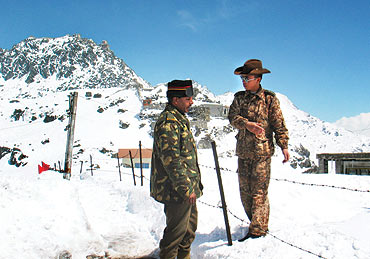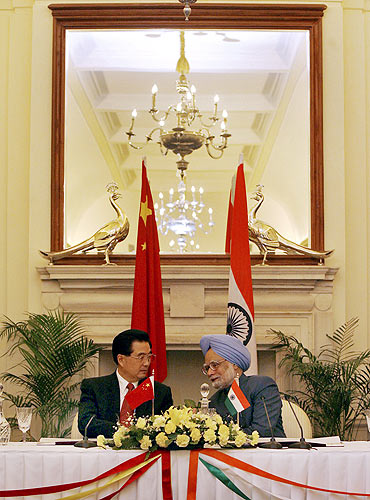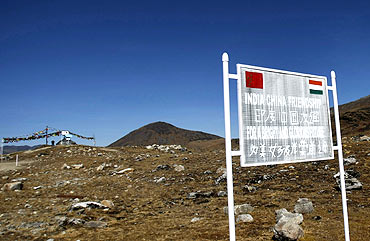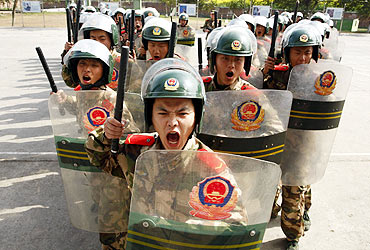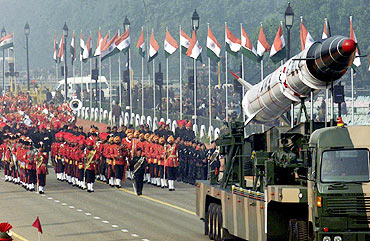 | « Back to article | Print this article |
Why India, China CAN'T afford to go to war
China and India marked 60 years of their ties on July 12, 2010. But the apparent show of camaraderie has not fooled political experts, who are wary of the frequent frictions between the two nuclear armed neighbours.
A recent article in the Foreign Policy claims that the possibility of a nuclear war breaking out between the two Asian giants is not that far-fetched.
The journal points out that both nations justify their massive defence spending citing other nuclear armed nations. China is stacking up its arms keeping in view the military might of the United States -- its only competitor to the position of a global superpower.
India has had an often hostile and perpetually unstable relationship with Pakistan for over 60 years. But tensions with other countries have not distracted India and China from keeping an eye on each other's military activities.
India wary of China's ties with Pakistan
The two countries are also suspicious of each other's foreign policies. China is wary of the burgeoning ties between the United States and India, and tried every trick in the book to derail the Indo-US nuclear agreement.
India, on the other hand, has cried foul over Beijing's decision to forge a nuclear agreement with Pakistan. New Delhi's grumblings over the issue were loud enough for the US to sit up and take notice. America recently voiced its disapproval over China's plans and said the two countries should abide by the rules of the Nuclear Suppliers Group.
India is also nervous about the increasingly friendly ties between its neighbours on the eastern and western border. Pakistan President Asif Ali Zardari recently visited China on what was hailed as an 'extremely successful' trip by Beijing. The Communist nation is also suspected of covertly helping Islamabad's nuclear programme and the Pakistan army.
China has also been building up its ties with nations located strategically near India's border -- Myanmar, Bangladesh and Sri Lanka.China's Arunachal fixation
Arunachal Pradesh remains another bone of contention between the two nations. While China has repeatedly staked claim to the north-eastern state, India has pooh-poohed these claims. Prime Minister Manmohan Singh has gone on record to say that Arunachal Pradesh is an integral part of India.
Reports about Chinese incursions into Arunachal Pradesh and Ladakh have further unnerved Indian authorities, though they have tried to downplay such incidents.
Interestingly, though India has undertaken various confidence-building measures to repair its rocky relationship with Pakistan, it is yet to do anything similar with its other troublesome neighbour to the north-east
China dismisses India's tall claims
Both India and China have pledged no-first-use of nuclear arms. But a recent war of words between the two governments exposed the chinks in the fragile balance that holds south Asia together.
Chief Scientific Advisor to the Prime Minister V K Saraswat, while boasting about India's ballistic missile technology, recently said, "As far as cities in China and Pakistan are concerned, there will be no target that we want to hit but can't hit."
China hit back by stating snidely, "We have never taken India as a strategic rival, and none of our weapons were specifically designed to contain India."
Why India, China CAN'T afford to go to war
But China is on its way to developing the world's most active ballistic missile defense system, says Foreign Policy. The magazine points out that Beijing reportedly possesses long-range missiles with independently controlled multiple warheads.
The Chinese army has been stocking up on its weapons in a base located in Qinghai province near Tibet. China's long range missiles like the DF-31s and DF-31As are capable of striking Russian bases in Siberia as well as Indian bases all the way to south India, says the magazine.
Not to be left behind, Indian defence scientists are working on the Agni-5, an upgraded version of the prestigious long-range missile that can strike targets at a distance of even 6,000 km. That includes even the Chinese cities located farthest from the border.
The magazine also mentions that the problem stems from both nations' refusal to acknowledge that a trust deficit exists between them. Mutual suspicion and lack of confidence-building measures are propelling both India and China into a dangerous arms race that may destablise the entire region, warn experts. Sporadic accusations against each other and sudden missile tests will only worsen the already shaky ties between the two nuclear armed nations.
